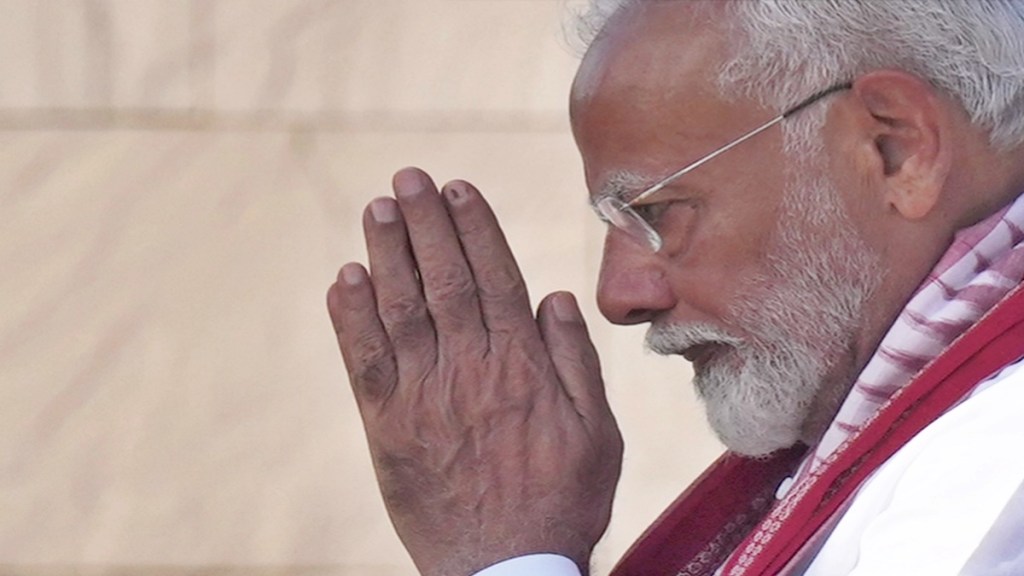The Bharatiya Janata Party (BJP)-led National Democratic Alliance (NDA) government took oath on Sunday, with Narendra Modi appointed as the Prime Minister for a third straight term. However, this time there’s a difference as he returns as India’s PM with a compromised mandate. With the conclusion of the 18th Lok Sabha Elections, it was clear that the saffron party had fallen short of the magic 272 majority number, securing 240 seats and falling short by 32 seats on its own. However, the NDA, a coalition of 14 parties, collectively managed to grab 53 seats, boosting the alliance’s tally to 293 seats and ensured a stable but coalition-dependent government.
Between 2019 and 2024, the BJP’s Lok Sabha seats dropped from 303 to 240, with the bulk of the losses occurring in the Hindi heartland states of Uttar Pradesh, Rajasthan, and Haryana. These three states alone accounted for 44 lost seats, playing a major role in the party’s overall decline.
Anti-Muslim dog whistle
‘Infiltrators’, ‘those with more children’, and ‘vote jihad’ – these were the phrases used by Prime Minister Narendra Modi while campaigning in Uttar Pradesh, Haryana, and Rajasthan. In Rajasthan’s Banswara constituency, one of the seats BJP lost with over 2 lakh votes, Modi attacked the Congress manifesto, alleging that during their tenure, they prioritised Muslims, suggesting they would distribute the nation’s wealth to those with more children and infiltrators.
A major shocker came when BJP lost the Faizabad constituency that also includes Ayodhya, where the Ram Mandir was inaugurated with much fanfare. However, the excessive emphasis on Hindutva, which is the core ideology of the BJP, and the religious polarisation that has previously worked in its favour, failed to yield the expected results this time.
According to Nilanjan Mukhopadhyay, an author and analyst who penned a biography of Modi, “There had been an overkill. And beyond a certain point, people were not very comfortable with the politics of religious polarisation,” he told Financial Express Online. “It had become too much. Mangal Sutra, Mutton, Mughal, everybody was able to realize that the Congress has not made any such promise in the manifesto. But lies after lies, half-truths after half-truths. Everything has a certain use-by date. Mr. Modi’s presentation of the Hindu, hard Hindutva line, was not working with the people any longer,” he said.
On the other hand, political analyst Rashid Kidwai accused Modi of practicing the politics of negativity. “Mr. Modi’s thing of politically being a victim was very useful when he was not, Prime Minister or even he was a first-time Prime Minister. If you’re going on a third term, you cannot be talking about, victimhood because people think that you are in power.”
Caste politics: The Yadav factor in Uttar Pradesh
In Uttar Pradesh, the Yadav community, comprising approximately 10% of the state’s population, has traditionally wielded significant influence in the state’s political dynamics. The party’s failure to effectively engage with the community and address its concerns caused a decline in its popularity. The BJP’s struggles in Uttar Pradesh can be attributed to its inability to tap into the Yadav vote bank, which has historically backed the Samajwadi Party (SP) and the Bahujan Samaj Party (BSP).
According to political analyst Amitabh Tiwari, “BJP has been winning UP because they have created a wedge between the Yadav and the non-Yadav vote. Yadav population is 10%, non-Yadav population is 30%. They have been getting 60-70% of the non-Yadav vote.”
“Now, this time there was discontent amongst five communities because of various reasons. Kurmi, Kuswaha, Nishad, Pal, and Maurya, five caste groups that comprise around 7-8% of the population perhaps. And this time they have given more tickets to OBCs than BJP. So BJP has given 23 tickets to OBCs, while the Samajwadi Party gave 32 tickets to OBCs. So when the contest got localised, the OBCs shifted towards the INDIA bloc. That’s why you see BJP’s vote share declining from 50% to 41%. A 9% drop, largely because OBCs moved away or non-Yadav OBCs moved away.”
Did BJP’s 400 paar slogan backfire?
Following the announcement of the seven-phase Lok Sabha elections, the BJP launched their campaign with the singular slogan ‘Apki Baar 400 Paar’. However, the party failed to provide a clear rationale for their aspiration to surpass 400 seats.
Political strategist Abhimanyu Bharti elaborated on how the ‘400 Paar’ slogan worked in favor of the INDIA bloc. “Opposition propagated that if they (BJP) cross 400, they will change the Constitution, they will remove reservation, and this narrative somehow stuck with the lower OBCs that reservation could be in danger. Although it was said ‘400 Paar’, he (Modi) didn’t give enough reason to why he needs 400 Paar. So, people thought why 400 Par? Modi couldn’t give a reason.”
Jaat anger hurt BJP in Haryana and Rajasthan
Strong anti-incumbency, the farmers’ strike, and the wrestlers’ protest were a few reasons behind the Jaat community’s anger, which was reflected in the BJP’s electoral performance in Haryana. Despite the BJP’s historic success in consolidating the anti-Jat vote, they couldn’t replicate the same level of support this time. Additionally, a breakdown in the Other Backward Classes (OBC) vote and dissatisfaction among the youth regarding the Agniveer scheme and leadership crisis contributed to the BJP’s electoral downfall.
“Haryana faced very strong anti-incumbency. In Rajasthan, many seats are adjoining Haryana. In Haryana, there was a coalition government that broke down. They evicted Manohar Lal Khattar because they thought they would be able to minimize the anti-incumbency factor, but they weren’t able to. This anger is rooted in the farmers’ strike. Specifically, farmers from Haryana supported the farmers who came from Punjab,” said Mukhopadhyay.
“In Rajasthan, the constituencies where the BJP lost are close to the Haryana border. Secondly, after the BJP won Rajasthan, their choice of candidate was inappropriate because someone completely new and unknown in Rajasthan was made the chief minister, which caused problems,” he added.

